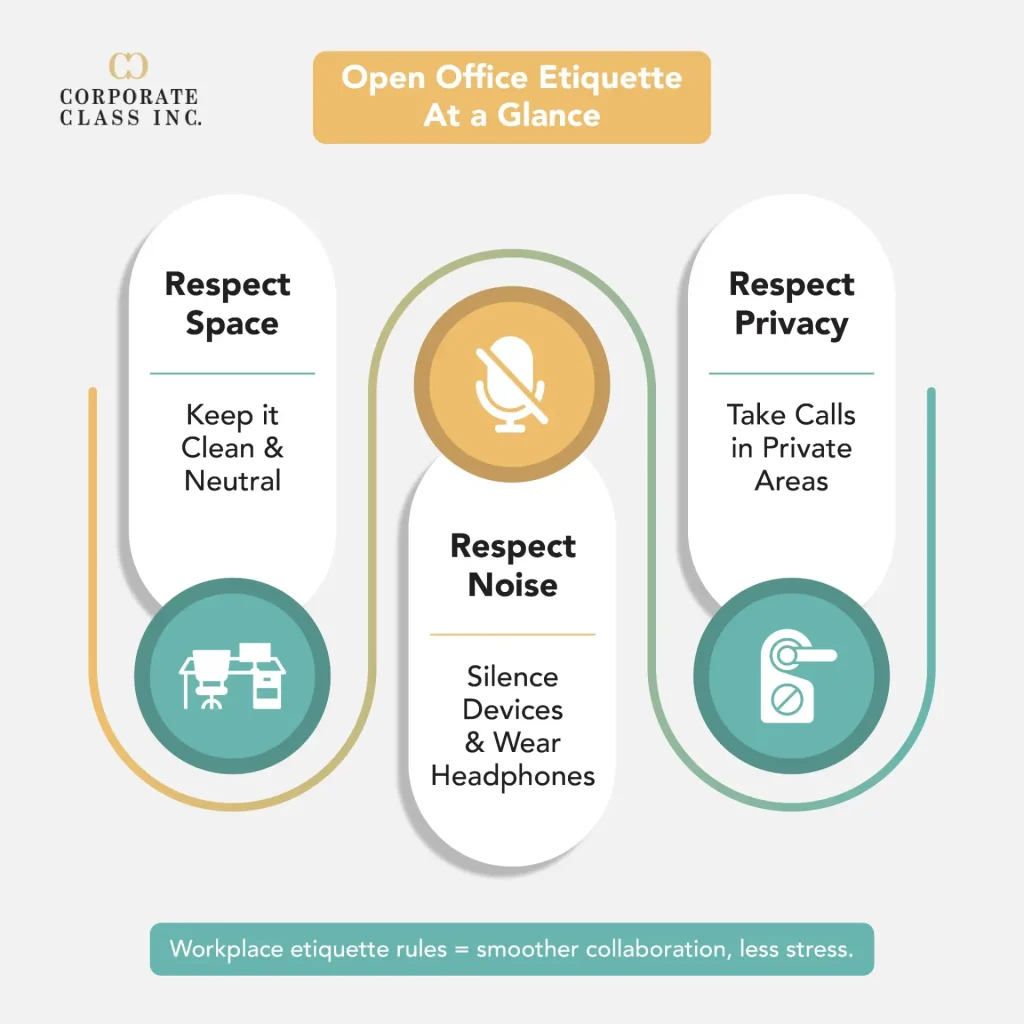Office layouts have shifted dramatically over the years, and so have the expectations around behaviour in these shared environments. Today, workplace etiquette rules are more important than ever as open office plans become the norm. Employees are expected to balance productivity, professionalism, and respect in spaces that have fewer walls and more shared responsibilities. These etiquette practices not only preserve harmony but help reinforce a culture of collaboration and respect.
Improve team collaboration by joining our Five Behaviors of a Cohesive Team workshop.
Gone are the private cubicles and corner offices. Today’s modern workplace features treadmill desks, shared lounges, and even nap pods. And while these perks may boost morale, they also bring new challenges in navigating day-to-day interactions. Without the right etiquette, even a simple conversation can disrupt the flow of an entire team.
Key Takeaways
- Clear communication and spatial awareness are critical in shared workspaces
- Etiquette rules in the workplace help prevent disruptions and maintain professionalism
- Adapting to open offices means being mindful of noise, scent, privacy, and shared areas
In this post, we’ve compiled ten workplace etiquette rules tailored for open-plan offices. These simple habits help everyone feel respected and stay focused.
1. Keep short visits, well, short
It might feel convenient to shout a question across the room, but it’s rarely respectful. Loud interruptions not only distract the person you’re speaking to but everyone else around. If you need to talk to someone, walk over and keep your visit concise.
Short interruptions can break concentration, especially in environments that rely on deep focus. Even a friendly chat can delay someone’s momentum. By keeping your visits brief and intentional, you’re respecting both your colleague’s time and the collective workflow of the room.
2. No egg salad for lunch, please
Shared spaces come with shared air. Strong-smelling food can linger long after lunch is over. While eating at your desk is often necessary, consider how your meal might affect those around you. Stick to food that’s quick, tidy, and low on odour.
Open offices often lack ventilation that clears strong odours quickly. The lingering scent of reheated leftovers or pungent ingredients can affect nearby coworkers for hours. Respecting the communal airspace contributes to a more pleasant and inclusive environment.
Want to build habits that make shared spaces work better?
3. It may be your desk, but it’s not your desk
Personal touches are fine, but in an open office, your workspace is visible to everyone. What used to be private is now public, and clutter can distract or even signal disorganization. Keep things neat, professional, and minimal.
In an open environment, visual distractions impact collective productivity. Excessive decorations, noisy gadgets, or unkempt paperwork can clutter not just your space, but also others’ sightlines. Think of your desk as part of the shared visual landscape, it should communicate clarity and competence.
4. What if you need some privacy?
Open offices don’t eliminate the need for focus or discretion. If you need to work without interruption, try placing a polite sign at your desk. A clear message like “Time to Focus” can help others respect your workflow without creating awkwardness.
Many offices now offer “focus zones” or allow portable desk dividers. Even noise-cancelling headphones signal that you’re not available for casual chat. Communicating your need for quiet doesn’t make you antisocial, it shows that you value deep work.
5. A phone call with the president
Confidential conversations deserve confidentiality. Avoid discussing sensitive topics near others or in open areas. Use a meeting room or quiet corner for important calls, and never leave confidential documents lying around.
Discretion is part of professionalism. Open office workers must treat every document or conversation as potentially visible or overheard. Simple actions like locking screens, facing monitors away from walkways, and securing papers reinforce workplace trust.
6. Is your ringtone Lady Gaga’s newest release?
Noise distractions can ripple across an entire office. Keep devices on silent or vibrate and use headphones for music or video calls. Not everyone works well with background noise, so your silence is a courtesy to others.
Even small digital interruptions, a ping, a buzz, a calendar alert, can derail someone’s concentration. Consider switching to silent alerts, disabling push notifications, or setting do-not-disturb modes during peak work hours.
7. Avoid the urge to gossip
The openness of the office doesn’t invite open sharing of everything. Gossip travels fast and reflects poorly on you. Keep things professional, and if you need to discuss someone, make sure it’s respectful and necessary.
Gossip undermines trust and morale. It creates unnecessary tension and damages reputations. If you have concerns, escalate them appropriately rather than speculating at the water cooler. Respect breeds integrity.
Gossip hurts culture. Respect builds it.
8. Clean up after yourself, Gordon Ramsey!
Shared kitchens and lounges should feel neutral and usable by everyone. A dirty coffee mug or snack wrapper might not seem like much, but it adds up quickly. Always leave the space as if you were never there.
Office etiquette means treating shared areas as community property. Refill the coffee pot if you take the last cup. Wipe the microwave after spills. These habits reflect care for your environment and your colleagues.
For etiquette around food and social functions, read Dining Etiquette Matters.
9. I love Chanel No. 5 too, but…
Personal scents can be a big issue in enclosed environments. Some colleagues have allergies or sensitivities. A subtle application is fine, but anything more can distract or discomfort others. Keep it light and non-invasive.
Even products like scented lotions, deodorants, or cleaning sprays can trigger reactions in sensitive coworkers. Choose unscented or hypoallergenic alternatives when possible, and check your office’s scent policy.
10. If you’re sick, take a sick day
Coming to work when you’re unwell may seem like dedication, but it puts others at risk. In close quarters, germs spread fast. Staying home is a sign of responsibility and respect for the entire team.
With hybrid work policies now common, many companies support remote attendance when you’re mildly ill. Use those tools. Protecting team health is part of strong professional etiquette.

DOs and DON’Ts of Open Office Conduct
stressful for everyone. These practical habits can make or break the shared experience for your team. When adopted consistently, they support mutual respect, limit distractions, and keep productivity on track. More importantly, they reinforce foundational workplace etiquette rules that help your environment run smoothly.
DOs
- Use headphones when listening to music: Open spaces amplify sound. Headphones let you enjoy your favourite work playlist without impacting others’ ability to concentrate.
- Keep your voice low during calls or conversations: Even casual work discussions can travel. Try to speak in a soft tone, especially when the room is quiet.
- Respect shared space by cleaning up after yourself: Treat kitchens, lounges, and meeting rooms like public property. A quick wipe or returning supplies to their place shows care for your colleagues.
- Take confidential conversations to private rooms: Always look for enclosed areas when discussing sensitive topics. This safeguards both company information and personal boundaries.
- Acknowledge quiet signals like “do not disturb” signs: If a coworker signals that they’re focusing, respect it. Don’t assume it’s personal, just give them the time they need.
DON’Ts
- Use speakerphone for calls: This is one of the most disruptive behaviours in any open space. Use headsets or move to a meeting room.
- Bring loud or smelly lunches to your desk: Foods that crunch, crackle, or carry strong smells linger long after lunch. Use the break room instead.
- Interrupt colleagues without checking first: Even in open spaces, people may be deep in work. Ask if it’s a good time before jumping in.
- Decorate your desk excessively in a shared area: Bold decorations can be visually overwhelming. Keep it minimal, especially when desks are visible from multiple angles.
- Leave confidential documents in the open: Always store private documents in drawers or folders when not in use. Visibility matters in a shared environment.
By following these workplace etiquette rules consistently, you’ll not only support a professional atmosphere, but also make open office life more manageable for everyone.
…
Adaptation Tips for Hybrid or Remote Workers
Workplace etiquette rules apply even when you’re working remotely. While home offices feel more casual, maintaining a standard of professionalism is still critical. These behaviours reflect your reliability, communication style, and respect for team dynamics, even when you’re not in the same room.
Hybrid and virtual settings bring their own challenges. It’s easier to unintentionally break etiquette norms when face-to-face feedback isn’t immediate. That’s why reinforcing digital versions of workplace etiquette rules, like punctuality, clarity, and presence, matters just as much as it does in physical offices.
Be camera-ready
Appearances count, even through a screen. Dress appropriately for virtual meetings and ensure your background is tidy. A polished look conveys attention to detail and signals that you’re present and prepared.
Mute yourself
In virtual calls, noise etiquette is critical. Always keep yourself muted unless speaking. Background noise is distracting and signals a lack of courtesy for others’ listening experience. If you’re joining from a busy environment, inform the group at the start.
Be punctual
Remote work requires more self-management than in-person environments. Log in a few minutes early, check your tech setup, and avoid joining late. When you respect others’ time, you reinforce trust and keep things moving.
Communicate proactively
Visibility drops in remote environments, so it’s your job to make your status clear. Use away messages, Slack updates, or calendar sharing to show availability. Prompt replies and scheduled check-ins reduce confusion and foster connection across locations.
These simple adjustments help hybrid and remote professionals align with core workplace etiquette rules, no matter where they’re working from.
Wrapping Up Workplace Etiquette Rules for Open Offices
Adapting to shared workspaces isn’t about sacrificing individuality; it’s about showing awareness. These workplace etiquette rules are simple in theory, but their real power lies in consistent practice. When everyone follows the same respectful standards, collaboration becomes easier, productivity rises, and office life improves.
Start applying these etiquette rules in the workplace, whether you’re in-person or remote, and you’ll build trust, comfort, and credibility every day.





